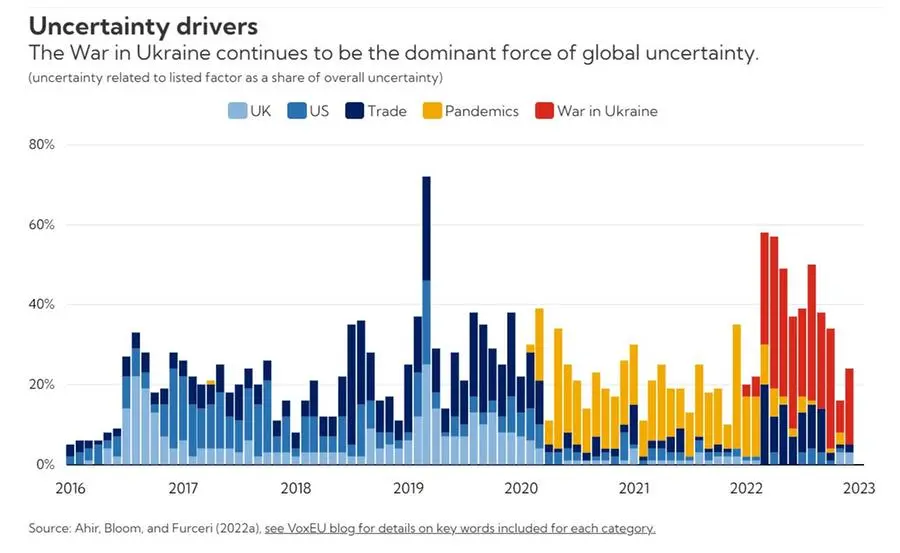PHOTO
Global economic uncertainty remains elevated and is weighing on growth due to “successive shocks” that include the cost-of-living crisis and the war in Ukraine, the International Monetary Fund (IMF) said Thursday.
The Washington-based lender’s World Uncertainty Index, which tracks economic unknowns across 143 countries, did fall in December compared to a month earlier, but it remained at high levels. The level of uncertainty last month, the latest reading, was also higher than in November 2021, which was prior to the Omicron wave.
The war in Ukraine, which continued to be the biggest driver, accounted for 19% of overall uncertainty during the month, up from just 8% in November.
“The shocks that have shaken the global economy in recent years have introduced a new normal of turbulence, driven in some cases by political fragmentation between countries. These episodes have also lifted uncertainty to exceptionally high levels, which in turn hurts economic growth,” the lender said in its latest blog.


Growth slowdown
The IMF had previously forecast global growth to slow from 6% in 2021 to 3.2% in 2022 and 2.7% in 2023. This is the weakest growth profile since 2001 except for the global financial crisis and the peak of the COVID-19 pandemic.
“Global economic activity is experiencing a broad-based and sharper-than-expected slowdown…The cost-of-living crisis, tightening financial conditions in most regions, Russia’s invasion of Ukraine, and the lingering COVID-19 pandemic all weigh heavily on the outlook,” the lender said in October.
The IMF has been tracking the conditions affecting the economic outlook through its World Uncertainty Index.
To better track the evolution of these uncertainty drivers, the lender updated the index recently to show more frequent readings that are monthly, instead of quarterly, and incorporated data dating back to 2008.
Previous spikes
Economic uncertainty had climbed following the UK’s unexpected vote to leave the European Union and surged further after the US presidential polls in 2016.
More shocks followed, including the US trade tensions with China, causing major uncertainty. In 2020, uncertainty levels spiked with the onset of the pandemic. This was followed by a significant spike in April 2021 due to the war in Ukraine, and in November of the same year due to the cost-of-living crisis and the monetary policy.
“The index fell in December, the most recent reading, but has continued to hit elevated levels,” the IMF said.
“[The index] has continued to hit elevated levels in recent times on the back of successive shocks, including most recently Russia’s invasion of Ukraine and the associated cost-of-living crisis.”
IMF Managing Director Kristalina Georgieva said this month that the lender is not likely to downgrade its economic growth forecast of 2.7% for 2023, as the anticipated oil price increase has not materialised and employment conditions remain strong.
(Reporting by Cleofe Maceda; editing by Seban Scaria)





















